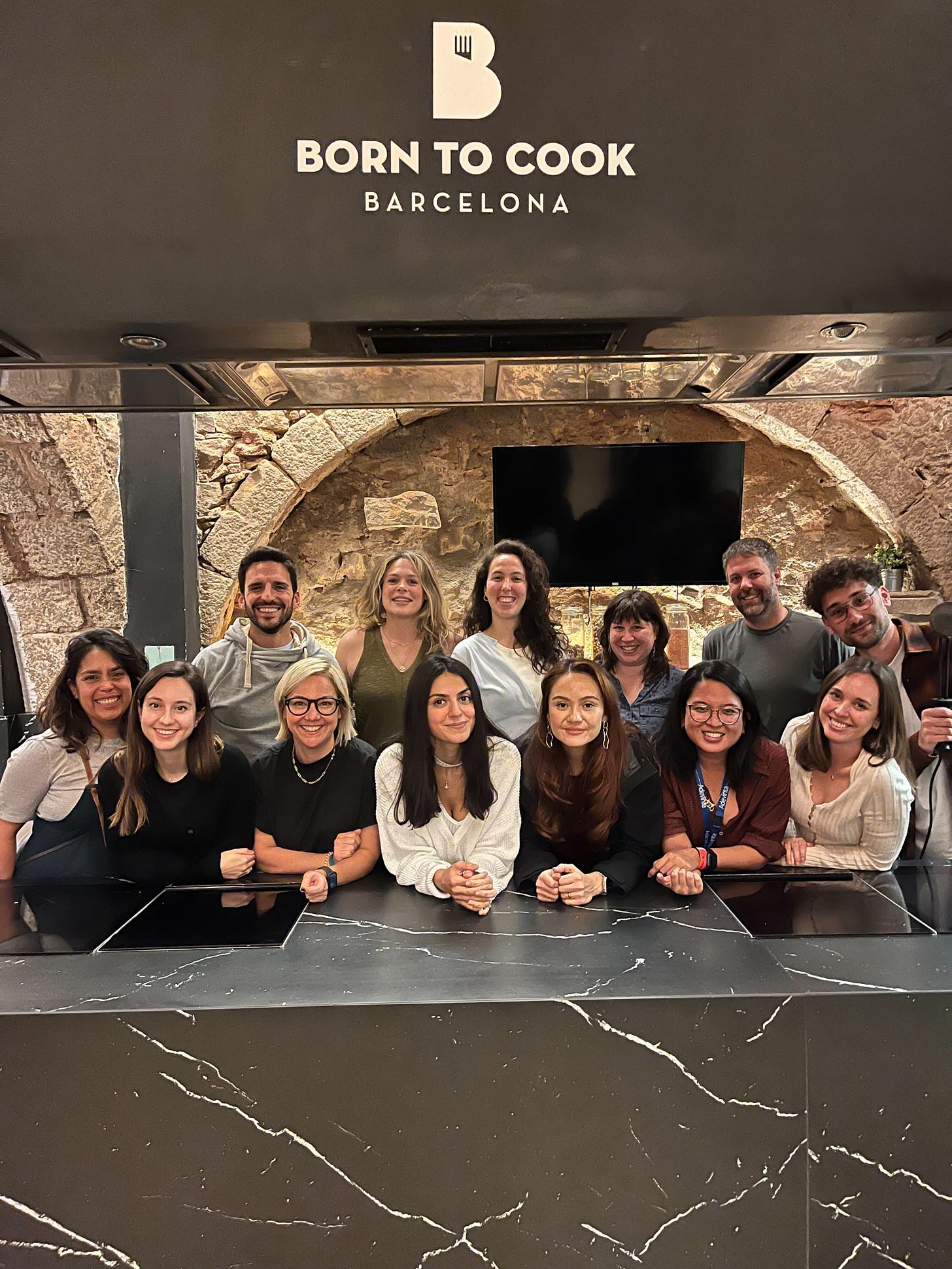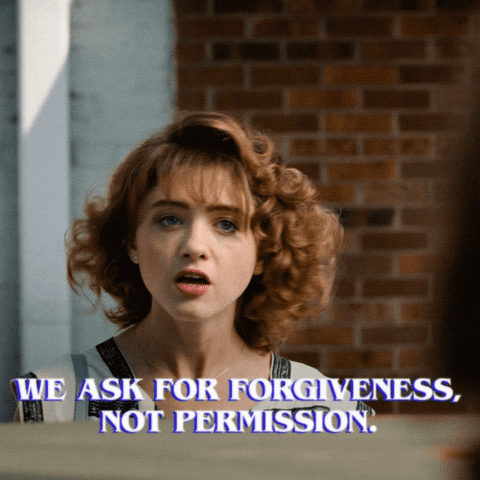Issue #40: 3 Lessons on Leadership, Building Products, Career Development from 2023 and the Mindset to Carry in 2024
And 5 resources to help you get started on your career goals for 2024
Hola friends! 👋
It’s the time of the year when 1 out of 3 newsletters will probably be saying:
What A Year! 🎉
It’s been 3 months since I sent my last newsletter. I had to hit the pause button because there were too many things happening all at once.
A big ass transformation project at my day job, a new personal project I found myself unable to say no to, and new women to help have successful careers in tech.
…On top of what was already on my plate.
Let’s just say I bit off a lot more than I could chew. At some point in October, I felt myself being stretched too thin and on the edge of burning out. So I did what we, Product People, have been taught to be the most important part of our job — I prioritized.
Things have calmed down now. And we are writing again! So let me share my last story for 2023, which also happens to be my first for 2024.
Because whew… What a year! But we made it!
What about you? What have you been up to the last 3 months? Care to share in the comments?
💙
Kax
You can also find me on Twitter, Linkedin, and Instagram
1️⃣ 3 Lessons on Leadership, Building Products, Career Development from 2023, and the Mindset to Carry in 2024
The days in-between Christmas and New Year, when most of us have magically transformed into a couch, are perfect for taking stock of what we’ve achieved and how we’ve grown in the last 12 months. So that we can repeat and scale the good things and learn from the things that were not.
***
A Lesson On Leadership: Lead with your values and be the leader that YOU want to be
In the early days of my leadership, I was struggling to be a good leader. I read the books, I listened to feedback. I tried my best to be the kind of leader that OTHER PEOPLE were telling me I should be.
Sure I had results. But they were unsustainable results. I was constantly just reacting to the complaints I was receiving. And because of that, I only had band-aid solutions. Often in conflict with each other.
Leading that way also felt like I was being pulled in 2M different directions all at the same time. I had zero boundaries. Because I naively thought that being anything and everything for my team, at the cost of who I was and what I valued, was what good servant leadership meant.
I was a burnout waiting to happen - unhappy, frustrated, and constantly stressed.
So “I gave up”. I stopped following what other people told me what good leadership was. The results were not good enough anyway to be worth feeling like I’m losing a grip on myself.
And in “giving up”, things finally started to make sense. All of the books and feedback were telling me HOW. But I was never really rooted in MY WHY. And therein was the disconnect.
I finally slowed down enough to ask myself “What kind of leader do I want to be?”. And I found the answers in my values.
I want to be a leader who strives for excellence but not at the cost of my team’s well-being.
I want to be a decisive leader who is also inclusive and listens. The kind who people trusted but also could trust them back.
And I want to be the kind of leader who can create an environment that sets my team up for success.
Having a clear vision, it became easier to identify the problems that I actually needed to solve. With the right problems prioritized, it was easier to find relevant solutions to sort them out (does the process sound familiar?). And more importantly, I also realized, the solutions I needed, I already had.
I’m still growing. But I also now feel true to who I am and to the values I hold important.
And the true test of the pudding, I finally started seeing the results that I really wanted to see.
There’s a lot of good material out there on how to be a good leader. And people will always be generous to share what they think good leadership is. And while it’s good to consider them, they may not always be aligned with our values.
So it’s also equally important to trust that what you already know and who you already are, are what you need to start becoming the good leader that YOU aspire to be.
So ask yourself this: What kind of leader do you want to be?

***
A Lesson On Building Products: They won’t let you do it? Do it anyway.
Most of the Product People I coached this year came to me with this problem:
They won’t let us do (insert activity here)! There’s no product culture in my organization!
And I get the frustration. I’ve felt it too. Especially when every Product Manager and their cousins always talk about the 10M frameworks you need to know to become a successful Product Manager. Making it seem like putting these frameworks into practice is what makes a real Product Manager.
But with this frustration, there are 2 problems to unpack:
That our role as Product Managers is defined by the tools we know and the a we activities we do
That we need to ask for permission for the things that we must get done
That our role as Product Managers is defined by the tools we know and the sessions we do
It’s important to remember that our purpose as Product Managers is not to set up opportunity tree workshops, plan interviews, or write OKRs. Those are means to an end.
Our purpose as Product Managers is to provide clarity where there is none. To provide certainty where there are only assumptions. To provide clear priorities where there is only overwhelm.
How do we do that? Then this is where the tools come in.
But focusing on these frameworks and tools (and the inability to do them) is like fixating on solutions without an understanding of the problems we’re trying to solve in the first place.
That we need to ask for permission for the things that we must get done
One thing I noticed is that a lot of PMs feel that they need to be granted permission to do something they feel is necessary. Mostly because the process for is not yet set up and there are no resources to support it.
But the way argue about getting support is flawed. Often with just the reasoning of “this is the right way to do Product”. With no argument for value, the people who are supposed to grant permission end up with only one thing to think about: The Cost. Which usually means time, money, and opportunity. The usual constraints that most of the time spell out as N.O.
But here’s the thing:
We need insights on our users. Not just an opportunity tree.
We need confidence that the ideas we have will solve problems for our users. Not just an A/B test.
We need alignment. Not just OKRs.
When we start thinking more about what we really need, it’s easier to discern the activities that we have access to within the constraints that we have.
Focusing on the real need not only gives us options but also gives us options that we don’t need permission for.
And when push comes to shove and we still find ourselves needing to ask for permission, it’s important to realize that it’s not really permission we’re asking for — It’s resources. Often in the form of money.
And as we know from our users, people will willingly part with their money only if there’s value to be gained. And stakeholders and leadership, at the end of the day, they're people too. Go figure. 😉
***
A Lesson On Career Development: The stories we tell ourselves may be what’s holding us back from success
A recurring theme with the new and aspiring Product Leaders I coach is this nagging feeling they have at the back of their heads that they are not enough.
A feeling that’s brought on by their belief that they don’t have the right skills to drive the results that they want to have. And sooner or later the entire world will find out and take back the opportunity that was given to them.
And the belief brought on by constantly looking for things that were not going well, only acknowledging the things that they cannot do, and not recognizing the things that they have achieved.
And when the stories they tell themselves are always the negative versions of what’s happened, their behaviors and decisions follow.
They get scared to stand up for their perspective
They show up to important conversations insecure
They stop themselves from taking up the bigger space they deserve
And the impact of these behaviors can be critical.
They’re passed over for promotions to senior roles
They’re treated as somebody more junior than they are
They’re burned out from trying to prove their worth over and over again.
I know this very well. Because I suffered from this too.
Our successes and how we made them happen can be a big blind spot. Especially if we’re so used to downplaying or even ignoring them.
When we don’t acknowledge our good work, we end up not knowing what our value is. And in turn, impacts how we show up and advocate for ourselves.
And this energy? It spreads. If we’re unsure of ourselves, why should the people we work with, feel any different?
Yes, It’s important that we know our gaps because they are opportunities to grow. But it’s also important to adopt a mindset of positive reinforcement for ourselves. And to be the first person to believe that:
Our light is already shining so bright it’s blinding
We’ve already accomplished so many things the results are incredible
Our successes happened because of OUR skills, hard work, and knowledge
So we can always show up as the best and strongest versions of ourselves. Always ready to take on any challenge. And fully equipped and well-positioned to successfully deliver results.
***
So learning what we’ve learned, here are a couple of mindset changes that I hope we all take with us into 2024
A career in Product Management is meant to be challenging and fun. Not frustrating.
Being a Product Leader is supposed to be a stretch. Not in conflict with our values.
And the path successful career in tech is meant to be exciting. Not an express way to burnout city.
We think career success is limited to the labels we earn through a promotion or a new job. Those are great things, don’t get me wrong.
But having a successful career can also be found in:
Being able to enjoy our day-to-day with the people we work with
Finding an environment where we can learn and feel safe to fail in
Having the voice to say no to the things that are not aligned with our values
So go after the promotion. Go after the new role.
But don’t forget to go after the things that also make you happy, make you better, and make you feel fulfilled. And sometimes these things exist outside of a title.
2️⃣ Five things to help you to achieve your goals in 2024!
For the Product Leaders out there who are struggling to figure out their brand of good leadership - watch the talk I did for the Industry Conference in Dublin about accidentally becoming a Product Leader or you can also listen to the podcast episode I recorded with Product Experience by MTP
For aspiring Product Leaders (and their managers) who are gearing up for their next step in leadership and want to prepare - read this article I wrote with Rocketlog on Navigating the transition to a leadership role
For the Product Managers out there who are struggling with alignment, collaboration, and getting some processes in place - listen to the podcast episode I recorded with Product Momentum on outcomes, output, and Ru Paul’s drag race.
For the managers and their reports who are struggling to collaborate with each other - watch the talk that Sara Guiral and I did for La Product Conference in Madrid on having successful dynamics between Managers and their Reports
For all you Product Builders out there who want to feel strong, confident, capable, and in control of your day-to-day job (not to mention your careers) - I have 3 open coaching slots starting in January and I’d love to help you get clear on your goals and create a fun and fulfilling career in Product Management and in Tech. Let’s chat!
We’re almost at 1000 subscribers! Help me help more people with practical strategies and relatable stories on Leadership, Product Management, and Career Growth by sharing my newsletter with your friends, colleagues, and neighbors! 🫶
See you again next week!







"We need alignment. Not just OKRs."
Preach!
Glad you are back Kax! I missed your newsletters on product leadership.